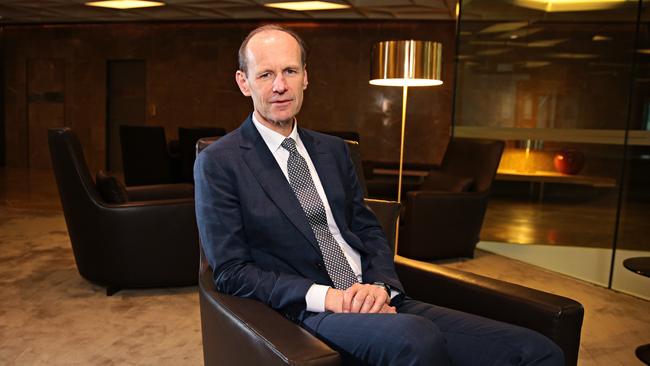2019 CEO survey: Shayne Elliott, ANZ
ANZ’s Shayne Elliott says economic growth is now slower that what people are used to and rate cuts will take longer to work.

Every year The Australian’s John Durie asks some of the biggest names in Australian business five key questions about what’s coming in the year ahead.
Here, in his own words, is what ANZ CEO Shayne Elliott sees ahead in 2020.
You can read more from the CEO Survey here.
How is your company affected by low interest rates and what is needed to boost the economy?
As rates get closer to zero like they have this year, the gap between what we pay our deposit customers and what we charge our lending customers obviously gets squeezed and this, in turn, impacts our bottom line. However, these lower rates are helping our home loan customers pay down their debts faster, and this is a good thing for the economy. I do believe in the longer term these cuts will provide an economic boost; it will just take longer than it has in the past. While there is softness in some parts of the economy exposed to discretionary spending, there are also some very solid fundamentals, such as low unemployment and low loan default rates. This is telling us that things are still pretty good, but we are not growing as fast as we are perhaps used to.
What is the impact of government regulations on your company, including those applying to the financial sector?
There have been some significant regulatory changes this year given the royal commission finalised its report at the start of the year. We’ve been working hard to meet the letter and spirit of the recommendations and have made significant progress on the sixteen initiatives we announced in February. We’ve already met 13 of the 15 Sedgwick pay recommendations that we can act on now and have almost completed the other two. The introduction of the new BEAR regime has been a good thing for the industry, and we have made our senior executive accountability framework stronger as a result. Another change that has had a positive impact on our customers was APRA’s decision to reduce the minimum interest rate buffer for residential mortgages in July. In response, we lowered our serviceability floor to 5.50 per cent, and this has made it a bit easier for customers to access lending.
What percentage of company revenues are spent on research and development, and how is your company using technology to improve performance?
This year, we invested a record amount of $1.4bn in new systems and technology, and we will invest more again in 2020. These investments are designed to strengthen our infrastructure, reduce the risk of running the bank and drive better services for our customers. This makes ANZ one of the largest technology investors in the country and is essential for building capability over the years to come. We have also invested a further $65m into our ANZi arm for partnerships with fintechs and the like. That’s the team helping us prepare for a more digital world with strategic investments in other businesses that may one day form part of our services.
What are the three major policy issues facing the country and what should be done about them?
It’s so much easier to direct from the side lines than to actually take the tough decisions and drive change. That said, there seems to finally be some movement on energy policy, which has been a complex issue for many years. If that is addressed, it could provide a great deal of certainty for many businesses to then confidently invest more. Infrastructure investment is another area where we could see positive flow-on effects for the broader economy. There has been a lot of infrastructure investment already, but as our nation continues to grow, we need further investment. It’s good to see some significant announcements in this space lately. The really difficult part is choosing the right projects because they can’t all be done at once. There has been a lot of focus on Australian education standards lately and rightly so as a highly functioning school system is an essential part of our ongoing prosperity. We have seen in our workplace the rapid rate of change in knowledge and skills over recent years, and we need to be equipped for more of this in the future. That starts with our schools. Luckily, we already have a decent system and lots of highly qualified people to shape appropriate policies to ensure it further improves.
What are the major impediments to long term growth facing your company and what can or is being done about them?
The rapid rate of change as the economy goes through a digital transformation is the biggest challenge. It is affecting all businesses, and we are preparing for it by investing more than we ever have in building better customer experiences, partnering with organisations that offer better services than we can build, and launching new products and services. That’s easy to say. It’s much harder to do while also running a large business with existing demands. Time will tell, but I’m glad we started working towards this aim years ago and are not just starting it now. There is also a skills challenge; as we build a business for the digital economy, we also need to build data and engineering skills to help us get there and to grow the business in the future.




To join the conversation, please log in. Don't have an account? Register
Join the conversation, you are commenting as Logout